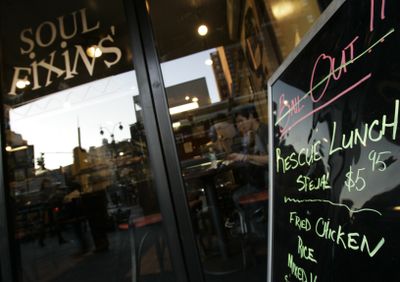Stimulus package could be stymied
Retail sales drop; so does Dow

WASHINGTON – Amid fresh signs that the nation is in recession – and yet another jaw-dropping decline in the stock market – Congress is gearing up to enact a new economic stimulus plan to help ordinary Americans.
But getting quick bipartisan agreement and White House support to help consumers might prove even tougher than the touch-and-go approval process for the $700 billion rescue plan for the financial system, which was ultimately passed last month.
Congressional Democrats and Republicans have different views of what a stimulus package should contain, and President Bush has signaled his opposition to some of the key ideas being floated.
What could force compromise is the outpouring of evidence that the nation is headed for tough times even if the financial system should begin to stabilize.
The Dow Jones industrial average plummeted more than 700 points Wednesday after the government reported that retail sales sank 1.2 percent in September, the third consecutive monthly decline and the largest plunge since 2005.
The unexpectedly steep drop was an ominous sign heading into the holiday shopping season and comes as more Americans are losing their jobs.
“I believe the economy is now in a recession,” said Richard DeKaser, chief economist at National City Corp., a banking company in Cleveland. “What today’s retail sales report implies is that it will be steeper than many of us had feared.”
The retail sales report coincided with a warning from Federal Reserve Chairman Ben Bernanke, who told a group of economists in New York that the government’s plan to infuse $250 billion into the banking system isn’t a cure-all.
“Stabilization of the financial markets is a critical first step, but even if they stabilize as we hope they will, broader economic recovery will not happen right away,” Bernanke said. He added that the Fed would continue to use all available tools to support the economy, leaving open the possibility of additional interest rate cuts.
Key members of both parties in Congress believe the government must find a way to put more money into the hands of average Americans, especially since consumer spending accounts for more than two-thirds of the nation’s gross domestic product.
“Clearly, a significant initiative is required to promote job creation and economic growth,” House Speaker Nancy Pelosi, D-Calif., wrote to Democratic members this week.
“I agree wholeheartedly that Congress should take additional measures to get our economy back on track, and we should not wait until January,” said House Minority Leader John Boehner, R-Ohio.
The question is whether Congress can unite behind a stimulus plan before a new president takes office. If not, substantial pump-priming might not take effect until next spring or summer.
What makes quick agreement problematical is that the two parties have different ideas about what a plan should contain.
Senate Majority Leader Harry Reid, D-Nev., unveiled a $150 billion package that mirrors a stimulus proposal made by Democratic presidential nominee Barack Obama this week, which includes spending on infrastructure projects, such as roads and school construction, extending unemployment benefits, providing energy assistance to low-income families and offering tax breaks to encourage businesses to hire more workers.
It also would require the federal government to be “more aggressive” in using its authority to push lenders to reduce foreclosures by minimizing mortgage loans.
House Democrats have been discussing a similar package that also would help states with such costs as Medicaid health care for the poor. Pelosi asked committee chairmen to hold hearings on such provisions and Bernanke already is scheduled to testify at one Monday.
Republicans, by contrast, favor tax cuts, including suspending the capital gains tax, lowering the corporate tax rate and offering federal guarantees on lending among banks. Among other things, they believe such measures would help create more jobs.
“Our constituents are not looking at the mess in Washington or Wall Street and asking for the federal government to take care of other governments,” Boehner said. “They are not asking for a one-term accounting fix to Medicaid or pork-barrel spending masquerading as stimulus.”
For his part, Bush, speaking at a deli in Michigan on Wednesday, argued that the government’s plan to inject billions of dollars directly into banks and buy toxic mortgage-backed securities would help workers and businesses.
“I was worried that if we did not do something about the financial situation, the economics would affect a lot of hardworking people all throughout our country, including right here in Western Michigan,” Bush said in Ada, outside Grand Rapids.
White House spokeswoman Dana Perino said Bush would consider economic stimulus proposals but has problems with some components being advocated by Democrats, such as extending unemployment benefits and funding infrastructure projects.